- FAQ includes how SC defined Hate Speech? What is origin and meaning of Secularism? Are USA/UK secular? Christian traditions during Charles Coronation! Equality before Law in India is a myth? India needs to Decolonise.
I am grateful to the Supreme Court (SC) bench comprising of Justices KM Joseph and BV Nagarathna for their order of April 2023 on hate speech whereby it extended the scope of its October 2022 order to all of India. The earlier order covered Delhi, Uttar Pradesh and Uttarakhand and stated “when any speech or any action takes place which attracts offences such as Sections 153A, 153B and 295A and 505 of the IPC etc., suo moto action will be taken to register cases even if no complaint is forthcoming,” To read 2022 order click on PDF.
Now police are accountable to the state
government, SC and indirectly to the Centre. Talk of multiple bosses!
1. But what is Hate Speech?
According to a May 1, 2023 report in the
Business Standard, the two judges termed hate speech as, “a serious offence capable of affecting the secular fabric of the country.” Reference
Hindustan Times
Has the word secular been defined in the
Indian Constitution? NO.
Hate speech would mean words which create
disharmony in society or provoke violence.
Thus, would the satire by stand-up comedians, contents in a holy book that support intolerance, non-violent public protests against actions of another community, discriminatory nature of India’s laws, use of Hindu cultural symbols like Dwajastambha
(see pic 8 of album) in non-Hindu places of worship and arguing for denial
of reservations benefits to Scheduled Caste/Tribes who convert be considered
hate speech?
Since the word secular can be subject to numerous interpretations the decision to register cases might be subjective. What is considered affecting the secular fabric in one state may not be the case in another for e.g. the movie Kerala Story is banned
in West Bengal but being seen across the country.
2. Does the Indian Penal Code
(IPC) have sections to deal with hate speech?
Yes. Sections are stated in para 1 above
for e.g. Section 153A of the Indian Penal
Code prohibits
citizens from creating disharmony or feelings of enmity, hatred or ill-will
between different groups of people which is
effectively hate crime.
Since hate speech is defined as, “a serious offence capable of affecting the secular fabric of the country,” the key word is ‘secular’. However, its meaning is not defined but implied even though it is part of the Preamble of Constitution. Thus, it becomes imperative to place certain facts about secularism.
3. Who brought the concept of
Secularism to India?
British!
They also introduced the word Minority which the Constitution does not define. The term Scheduled Caste was introduced by the British in the 1930’s and Scheduled Tribe around the time when the Constitution was adopted in 1950. The word Dalit finds no mention in the Constitution. Read History of word Dalit
4. Where did Secularism
originate and why?
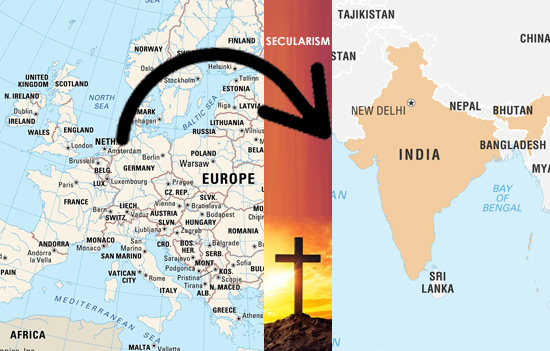
Secularism has its origin in Europe.
In Europe the church, controlled education/ property etc, became so powerful that even the king felt oppressed. So secularism meant separation of the church and state with intent to curb the influence and power of the church. Read Secularism, Past and Future (Ohio University)
According to Why Nehru
dropped and Indira included the S-word in the Constitution
published by the Indian Express, “The word ‘secularism’ is known to have originated in late medieval Europe. “Secularism, the theory that governments ought to have no religious connection, nor indeed anything to do with matters of religious belief or ritual, is manifestly a Western intervention, specifically a product of the Protestant Reformation and the Enlightenment,” writes historian Ian Copland. Majority of the makers of modern India,
shaped as they were, by European thoughts and practices, were ardent supporters
of secularism as well.”
The situation in India was
different. Sanatan Dharma was neither governed by a monolith organisation like
the church nor did it own property and control the state. Thus, the need for secularism
never arose.
Thus, as a concept secularism
is as alien to India as a three-piece suit is to the likable Lalu Prasad Yadav
(no offence meant).
For more on secularism read Pages 83 to 95
in India that is Bharat, by J Sai
Deepak.
5. Was India secular before
the British came, Constitution?
Depends on how you interpret
the word.
Long before secularism entered
popular discourse, the followers of dharma (read as Hindus,
Buddhists, Jains and Sikhs; the Indian Constitution includes all Indic dharmic traditions
as Hindus for the purpose of personal law) gave refuge to those who were persecuted in other countries for e.g. Parsis, Jews and a
body of Christian immigrants.
Indic thought permits multiple ways to
achieve self-realization unlike others and allows others to co-exist. Swami
Vivekananda said in 1893 Chicago address, “As the different streams having their sources in different places all mingle their water in the sea, so, O Lord, the different paths which men take through different tendencies various though they appear, crooked or straight, all lead to Thee.”
Read Comparing Indic vs. Abrahamic faiths–A Primer
6. Does the word Secularism find
mention in the 1950 Constitution?
No.
The founders of the Constitution deemed it appropriate to imply the concept of secularism without spelling out its meaning. The word ‘secular’ was made part of the preamble of the Indian Constitution during the Emergency (1975-77). However, the word was left undefined even then.
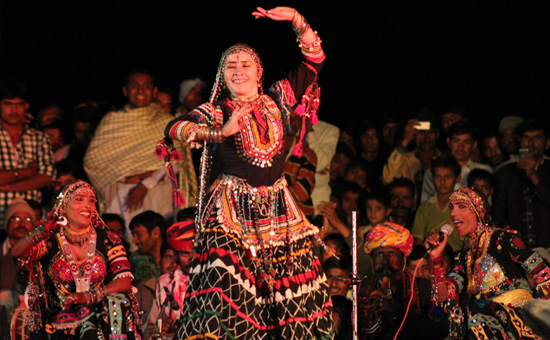 To learn Kalbelia dance, this Hungarian Muslim adapted to Indian culture. Now excels. 2013.
To learn Kalbelia dance, this Hungarian Muslim adapted to Indian culture. Now excels. 2013.
7. Has any government in post
independent India try to define Secularism?
Yes.
When the Janata Party came to power in 1977 an attempt was made to define ‘secular republic’ to mean a ‘republic’ in which there is equal respect for all religions’. The Janata government had a majority in the Lok Sabha but was in a minority in the Rajya Sabha where it was voted down by the Congress.
8. What about Supreme Court
on Secularism?
Here is an excerpt from the Supreme Court judgment on the Ayodhya Acquisition Act, 1993. Former Chief Justice A M Ahmadi said: “Notwithstanding the fact that the words socialist and secular were added in the preamble of the Constitution in 1976 by the 42nd amendment, the concept of secularism was very much embedded in our constitutional philosophy. The term ‘secular’ has advisedly not been defined presumably because it is a very elastic term not capable of a precise definition and perhaps best left undefined. By this amendment what was implicit was made explicit.”
Read Secularism and Constitution, an analysis
Interestingly, secularism has been
interpreted by the Apex Court as a part of basis structure of the Constitution
and referred to as equal treatment of all religions.
Read Secularism and Justice And How Hindu rights have been damaged by Article 28 and
the RTE Act
For an interesting SC order on Secularism
read Civil Appeal No 7095/2022 i.e. the Hijab matter. It quotes SC on
secularism as stated in numerous orders.
9. Does secularism mean equal
treatment of all religions?
1. If we accept this definition India is far from being
secular because Hindus are denied equal human rights e.g. right to manage their
temples.
Read Laws that deny Hindus human rights
Supreme Court defines Secularism as ‘equal treatment to every religion’. Firstpost 2016 Nothing could be further away from the truth. Read
Supreme Court has always upheld secularism
2. So, also in matters of Inheritance Hindu girls are entitled
to an equal share of property while Muslim women get less.
Read Comparing inheritance laws for Hindu and Muslim women
3. There are different tax laws for different religions.
Read Tax laws should the same for all Indian citizens
4. In 1993, SC ordered
payment of salaries to Imams
Has similar orders been passed for payment
of salaries to Granthis, Monks and Hindu priests?
Read All
you wanted to know about WAQF
10. Does secularism mean the
state does not have a religion?
The U.K. and USA are clear they are
Christian nations (see below). Indians
are confused so India is forever under playing Indic faiths and Dharma.
According to this article in The
Telegraph, “Justice Joseph cited the apex court judgment in M.P. Gopalakrishnan Nair vs. State of Kerala, 2005, which declared that “(i) The Constitution prohibits the establishment of a theocratic State. (ii) The State is not only prohibited to establish any religion of its own but is also prohibited to identify itself with or favouring any particular religion. (iii) The secularism under the Indian Constitution does not mean constitution of an atheist society but it merely means equal status of all religions without any preference in favour of or discrimination against any one of them.”
Before
Muslim invasions when India was only Indic, it did not become a theocratic
state as the West understands, so how can it become one today when population
of Hindus is 75-79% is worth pondering over!
Equal treatment of all religions in India is a myth.
Read What
is Hindu Rashtra
11. How does secularism
operate in the U.S.A?
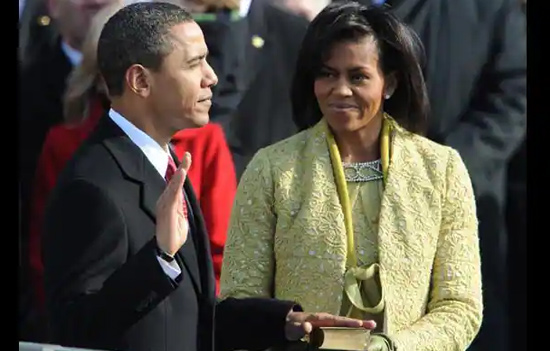 President B Obama takes oath as President with one hand on the Holy Bible.
President B Obama takes oath as President with one hand on the Holy Bible.
A detailed answer would require
a separate article. Suffice to say that the President of USA take oath with one
hand on the Holy Bible.
12. How does secularism
operate in Germany?
A detailed answer would require
a separate article. Suffice to say that Christians in Germany and some other
European nations pay a tax on their income to the church. This is akin to
Hindus paying a tax to the Shankaracharya or the sadhu akhadas,
the sant samaj!
Would you call the U.S.A. and Germany secular or communal?
The word secular does not exist in the Muslim world.
13. How does secularism
operate in England, the country that exported secularism to India?
A.
In England the king or queen is the head of state and church. Since being head
of state is the equivalent of the India President it is like saying that
President Pranab Mukherjee is head of the Vishwa Hindu Parishad.
B. 26 priests are nominated to the House of Lords, our Rajya Sabha. “As senior members of the Church of England, which is the established church, some bishops are entitled to sit in the House of Lords. The Archbishop of Canterbury, the Archbishop of York, the Bishops of London, Durham and Winchester and 21 other bishops in order of seniority together form the Lords Spiritual.” Source
“They read prayers at the start of each daily meeting and play a full and active role in the life and work of the House. The official proceedings of the House cannot begin until prayers have been read.”
This is like saying that 26 prominent
Pandits from Kashi, Sringeri, Kanchipuram, Sivasagar and Badrinath/Kedarnath
are nominated to the Rajya Sabha and chant Mantras before every session starts.
“The Archbishops of Canterbury and York and the Bishops of London, Durham and Winchester are ex-officio members of the House of Lords. The remaining 21 places are occupied by a mixture of those who are longest-serving as bishops of English dioceses, and those who qualify under the Lords Spiritual (Women) Act 2015.” Source
The
26 members belong to the Church. Does anything like this happen in Hindu
majority India? No.
14. What about Prince Charles’s coronation?
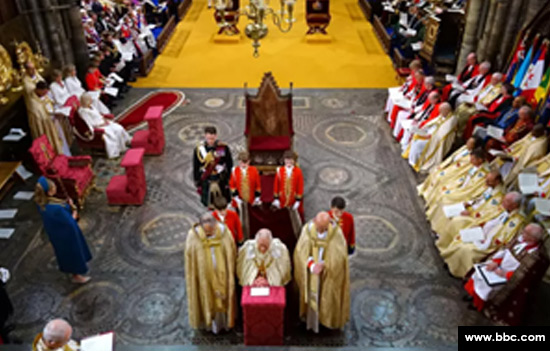
According to this report in CBS News, “King Charles has been crowned by the Archbishop of Canterbury, Justin Welby. Before placing the crown on King Charles' head, the Archbishop (he is the Chief Religious Figure in the Church of England and head priest) said: "King of kings and Lord of lords, bless, we beseech thee, this Crown, and so sanctify thy servant Charles, upon whose head this day thou dost place it for a sign of royal majesty, that he may be crowned with thy gracious favour and filled with abundant grace and all princely virtues; through him who liveth and reigneth supreme over all things, one God, world without end. Amen." After crowning King Charles, he said "God save the King!" King Charles will then be anointed with holy oil from Jerusalem by the Archbishop of Canterbury, who will pour the oil onto a spoon and anoint the monarch's hands, head and breast.”
Note that God is a Christian concept. Read What is the concept of God in Christianity and
Sanatana Dharma
The coronation took place at Westminster-abbey, the royal church and not the equivalent of India’s Rashtrapati Bhavan. King Charles was sworn as king by a Christian priest. India’s President is sworn in by the Chief Justice of India. The President’s head is not anointed with holy oil.
Anyone with doubts that the U.K. is a
Christian country was laid to rest during the coronation. I am not against the
process of coronation or any tradition followed but just saying.
Would you call the U.K. communal
or secular?
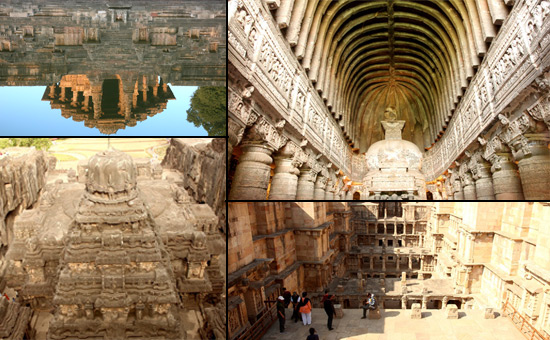 There is more to India than the Taj.
There is more to India than the Taj.
Food for Thought
One, how relevant is the Christian concept
of Secularism to Indian culture, ethos, identity and practice?
Read Hindus
cannot be governed by the Christian concept of religious denomination
Two, when the learned judges defined hate
speech as something that disturbs the secular fabric of our society, should
they have considered defining the word Secular in detail?
Three, since our Constitution is borrowed from the West is it time to replace foreign concepts with
Dharmic ones. After all the SC logo is, ‘Yato dharma tato Jaya’; where there is dharma, there is victory.
India needs to Decolonise.
Can the SC show India the way by reforming
its vacation policy?
Is it time for India to have an INDIC
Preamble. Here is a Proposed Preamble
The SC must realize that Bharat is the only
living Dharmic civilization. If it ceases to exist, India might become like what Sudan is today, divided into two. Closer home, see Pakistan.
The purpose of this article is solely to
provoke thought and not to cast aspersions or doubts on any
individual/organization or judiciary.
Author was educated as Macaulay’s child, now Indic and Chartered Accountant.
This article must not be republished
without written permission of www.esamskriti.com
Also
read
1. Ideas for more Women Judges
2. Looking beyond the Collegium system
3. Efficient judicial system shall improve ease of doing business
4. Dialogic Jurisdiction: A Step towards Constitutional Crisis by Judicial
Overreach
5. Dear CJI – Indians have lost faith in the judiciary
6. Producing vaccine is not like making 2 minute noodles
7. Constitutional issues arising from telecom, essar rulings
8. Mandatory declaration of assets by judges shall
increase transparency
9. Judicial Rush to save Investors is misplaced
10. Why India needs Urgent Reform in Higher Judiciary
11. Why these
deputations by CJI are raising eyebrows in legal circles
12. Judges must know
their limits, not act like emperors says SC
13. Supreme Court appointed committee submits report on
farm laws-yet to be made public
14. Speech
and Hate Crimes